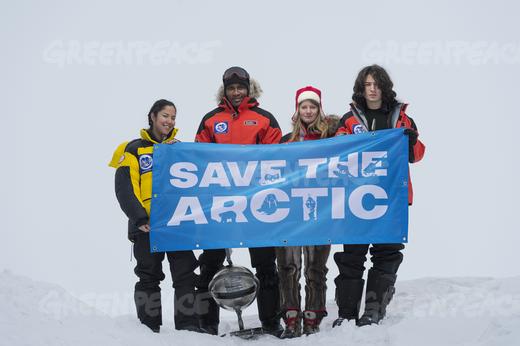 Amsterdam, April 27th 2014 – Greenpeace today revealed that the French oil company Total has purchased the first ever shipment of offshore Arctic oil from the Russian energy giant Gazprom. The environmental group accused Total of hypocrisy, citing a previous pledge by the firm’s CEO to avoid Arctic oil drilling due to the consequences of a major spill.
Amsterdam, April 27th 2014 – Greenpeace today revealed that the French oil company Total has purchased the first ever shipment of offshore Arctic oil from the Russian energy giant Gazprom. The environmental group accused Total of hypocrisy, citing a previous pledge by the firm’s CEO to avoid Arctic oil drilling due to the consequences of a major spill.The shipment has attracted controversy since last week, when President Vladimir Putin used a live interview with Gazprom’s CEO to hail the departure of the vessel from Russia’s Pechora sea. Putin claimed Arctic oil would boost ‘Russia’s future presence on global energy markets’. (1)
Commenting on the news, Greenpeace International oil campaigner Ben Ayliffe said:
“As this tanker nears Europe the controversy surrounding it increases by the day. Buying the first shipment of offshore Arctic oil increases our dependence on Russian energy firms and only serves to strengthen President Putin’s hand in the geopolitical game he’s playing.
“We must urgently shift away from fossil fuels towards more efficient, clean technologies. This is no longer a purely environmental imperative. It is increasingly crucial to our national security.”
In September 2012 Total’s chief executive Christophe de Margerie, told the Financial Times the risk of an oil spill in the Arctic had led him to rule out drilling in the fragile region. “Oil on Greenland would be a disaster,” he said. “A leak would do too much damage to the image of the company”. (2)
Ayliffe continued: “Total’s decision to buy this oil smacks of real hypocrisy. Its CEO has already pledged not to drill in the icy waters of the far north, and yet he is apparently happy to buy the stuff if Gazprom takes on the risk. Mr. De Margerie cannot have his cake and eat it.”
Gazprom’s Prirazlomnaya platform, where this oil originated, was the subject of a high profile environmental protest in September last year, after which 28 Greenpeace activists and two freelance journalists known as the “Arctic 30” were imprisoned for over two months on charges of piracy and hooliganism. They were freed following a global outcry.
